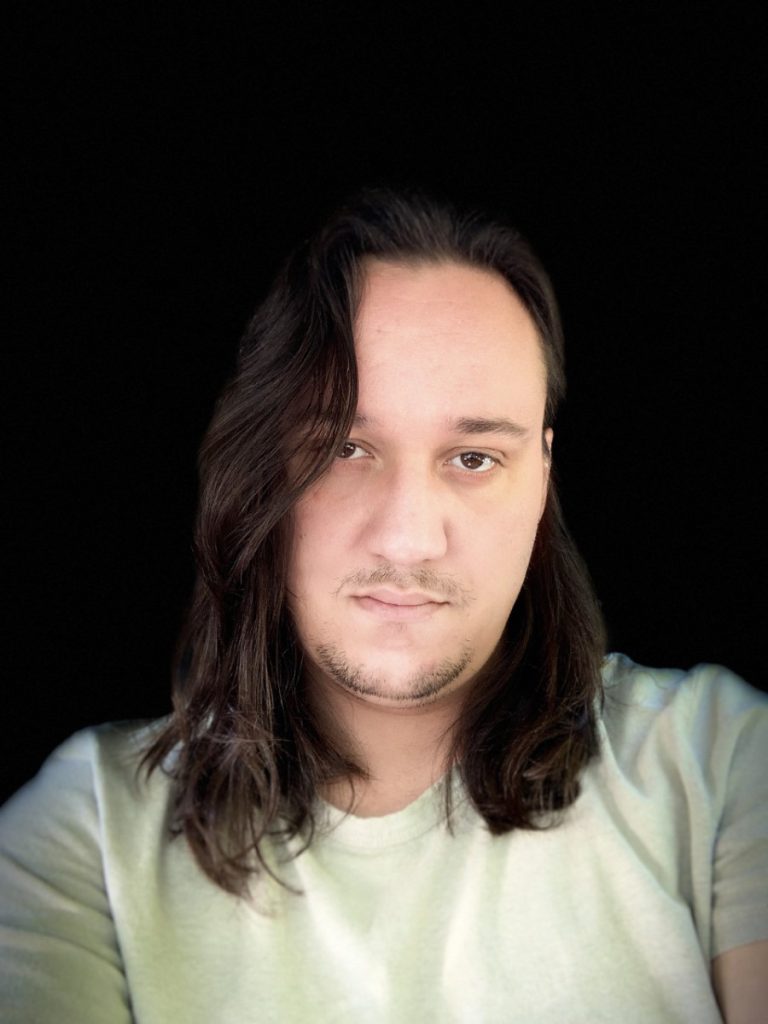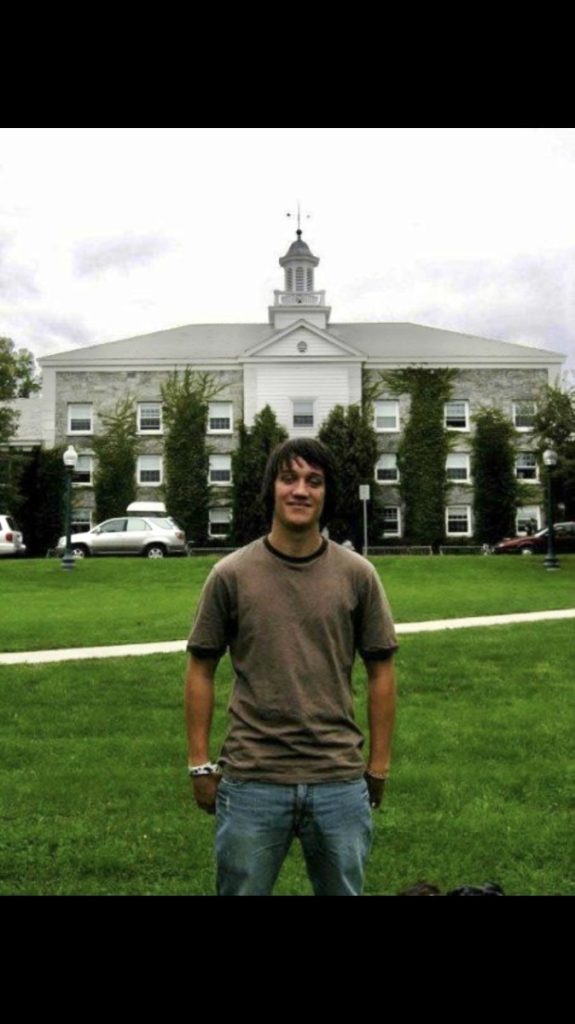
Lucas Gonzalez ’10 talks to NER intern Bella Cady ‘22.5 about his current work as an educator and what it means to “go boldly” into the literary world.
Bella Cady: What was the highlight of your experience as an NER intern?
Lucas Gonzalez: I had the unique chance to be the very first summer intern and totally immersed myself in the role. There was so much to do, and every little detail of my job felt new and exciting: riding my bike up to the old office at the Kirk Alumni Center in the mornings; wandering through the stacks of NER back issues; sifting through dozens of submissions, all of which were snail-mail back then. It sounds more and more romantic as the years roll on. I remember driving with Carolyn Kuebler to a storage facility outside of town to find obscure editions of the magazine in the cavernous NER archive. I recall that an entire garage-full adjacent to the archive was filled wall-to-ceiling with Stephen Donadio’s books alone, a detail which still staggers me. For years, I kept one of the coffee machines office manager Toni Best found for me at a local yard sale to make sure I was caffeinated enough to read through submissions and still work on my own writing at home. Thanks, Toni! Ultimately, understanding how NER—the writers, editors, and staff—worked together to create a standard-setting literary journal gave me a sense of the road map for my own journey.
BC: You were a co-creator of Blackbird, which is still in print today. What was your motivation for bringing an arts journal to Middlebury?
LG: My motivation for bringing a new arts journal to Middlebury was to shine a light on our literary and artistic community. Blackbird was manifested through a collectivist mindset of good friends. We realized a print publication was the perfect medium for creating a focal point for literary and artistic life at the college. It took the effort and dedication of a large group of multi-talented people who had the motivation, communication skills, technological know-how, and discerning aesthetic sensibilities to put it all together. After months of planning, discussion, content review, and production stumbles, we held the first issue in our hands. We knew we had accomplished something special by bottling the collective lightning. The fact that Blackbird continues to publish today goes to show we struck a nerve, and says something encouraging about the enduring vitality of literary magazines in our culture.
BC: Are there any particular skills that you developed as an undergraduate–in school or through internships–that you believe most benefited you in your professional work?
LG: I learned great project management through my time at NER. When I graduated, I was hired at 826 NYC as an intern, managing publication projects and volunteering as an after-school tutor. In my graduate years at Columbia University, I served as Community Outreach Editor at Columbia Journal. When I co-created the Incarcerated Writers Initiative at the journal, I remembered NER’s ethos and commitment to publishing regional, emerging, and marginalized writers. After months of outreach to currently-incarcerated writers, activists, and community organizations, we received over three hundred submissions from writers in over 30 states, everything by mail. It was like being back in the Kirk Alumni Center. The pieces we published I often reread and teach in the classroom.
I feel the resonance of my NER days in my current role, where I serve as faculty advisor to an amazing literary magazine, Stone-cutters. The magazine is an institution at Harvard-Westlake School, where it has been published for 27 years running. Much like Blackbird, the literary magazine operates as a literary/arts collective on campus. We publish a Winter Tabloid, a Spring Annual print publication, and release online content to our website, www.stone-cutterscollective.com. We also run student-led craft classes and workshops for all genres and mediums, visual, literary, and beyond. I also help organize Wider Than The Sky: A Young People’s Poetry Festival (www.widerthanthesky.org). Guided by a group of stellar faculty and organized entirely by our students, we’ve welcomed poets like Richard Blanco, Claudia Rankine, Natalie Scenters-Zapico, and Kaveh Akbar to our midst, focusing specifically on outreach to the wider Los Angeles community, especially underserved communities and schools.
BC: You’ve pursued both an MFA and MA since your time at Middlebury. Do you have any advice for students considering advanced degrees in the literary world?
LG: My advice would be to go boldly. If you’re thinking about a career in teaching and writing, the degree is a tangible way of getting a foot in the door and making your way in the literary world. Across the journey through both my MA and MFA, I made valuable connections with teachers and friends who guided and supported me towards realizing my ambitions, and continue to be my network and support system as a writer and educator.

BC: What brought you to teaching? How do you employ your experience as a writer to encourage aspiring writers?
LG: My very first informal teaching gig was on a dairy farm a few minutes south of the Middlebury College campus. A friend and I volunteered as English language instructors, teaching a group of men from Mexico employed as seasonal workers on the farm. The men ranged from aged 24 to 60. Each had traveled across the United States across the southern border to provide for their families. We hoped to offer language as a tool for access and agency in the complex odyssey of working undocumented in the United States. I came to realize something new and very real about the power of literacy. Writing brought me to that farm, and that farm brought me to teaching. Connecting it all is the hope that through education, we work alongside our fellow human beings with a common purpose towards bettering our world.
In terms of how my experience as a writer informs my work as a teacher, it’s easy for me to relate to the experience of struggling to find, refine, and hone one’s writing voice. As a practitioner of my craft, it’s much easier for me to know how to guide students with specific techniques at the level of their prose, creative expression, or exploration of a text. My hope is that my students can tell that I’m a genuine geek, and that my own sense of curiosity rubs off on them when it comes to the subject matter. I remember all my best teachers had truly awe-inspiring levels of nerdiness at the core of their persona in front of the classroom; they cared about their subject, but also cared about you and your own rapidly-expanding mind. As an educator, I hope to instill in my students a sense of interest in my academic discipline, while also affirming the infinitely nourishing feedback cycle of taking your own passions seriously.
BC: What have you read recently that’s moved you?
LG: Aside from various literary magazine subscriptions like Rattle, Fence, and Crazyhorse, I like to read through as much of the National Book Award long lists in poetry and fiction as I can. I also like to follow the work of my friends and former teachers closely. I was floored by Timothy Donnelly’s collection, The Problem of the Many. I have also recently been stunned by Barbara K. Fischer’s Ceive, Jay Deshpande’s The Umbrian Sonnets, Emma Cline’s Daddy, and Joseph Fasano’s The Dark Heart of Every Wild Thing. This year, I’m most looking forward to the publication of my thesis workshop mate’s first collection of poems, Alexis Jackson’s My Sister’s Country.